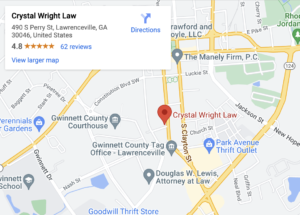Cohabitation and Spousal Support

Georgia spousal support laws outline several situations that could terminate alimony payments. For example, if a person receiving spousal support payments remarries, the spousal support ends.
In many states, alimony payments terminate if the ex-spouse cohabitates with another person. However, Georgia law does not automatically end alimony if your ex-spouse moves in with another person.
What is Cohabitation?
Cohabitation generally refers to two individuals who are not married living together in a personal, intimate relationship. In some cases, the parties may live together as if they were married, although they are not. For example, they may purchase a home in both names, share a bank account, and purchase personal property together.
In Georgia, some couples decide to enter a cohabitation agreement. The Georgia Supreme Court has recognized cohabitation agreements. However, the agreement does not create a domestic partnership.
Instead, a cohabitation agreement is a contract between the parties, much like a prenuptial agreement. The contract defines financial matters, property rights, and what happens if the parties separate. Instead of creating a marital relationship, it is designed to protect assets and property.
Unlike other states, cohabitation does not automatically terminate your spousal support payments in Georgia.
What Does Georgia Law Say About Cohabitation?
O.C.G.A. §19-6-19(b) discusses cohabitation after the court issues a final divorce order.
According to the statute, voluntary cohabitation in a meretricious relationship is grounds to modify the periodic payments of permanent alimony. A “meretricious” relationship generally refers to two parties living together with an understanding that there is no legal marital relationship. However, the parties share an intimate relationship and live openly and continuously together.
The code clarifies that cohabitation by an ex-spouse is “grounds to modify” a spousal support order. However, the code does not state that cohabitation terminates alimony. Furthermore, alimony will not end if your ex-spouse begins cohabitating with another person unless you take action.
What Should You Do if You Believe Your Spouse is Cohabitating With Someone?
Talk with a divorce lawyer now. The law gives you grounds for petitioning the court to modify the alimony order. First, however, you must prove that your ex-spouse does not require your support.
The law does not assume that the person they’re living with has the means to support them. Therefore, you need to prove that your ex-spouse and their current partner share living expenses. In addition, the parties must voluntarily choose to be in a relationship that shares a similar nature to marriage.
Furthermore, you need to prove that your ex-spouse and their current partner have an intimate relationship. The statute also requires that they live together continuously. If they only have periodic contact, it does not meet the criteria for cohabitation.
You must meet each of the criteria to prove that your spousal support payments should be modified or terminated on the grounds of cohabitation.
How Does Georgia Decide to Award Spousal Support Payments?
Not every divorce results in alimony payments. Spousal support is not guaranteed. Abandonment and adultery can make a spouse ineligible for spousal support payments. Generally, alimony in Georgia is awarded for long-term marriages (over ten years) when one spouse has minimal assets and/or earning potential.
Factors that a judge considers when awarding spousal support include:
- The duration of the marriage
- The couple’s standard of living while married
- Contributions made during the marriage of value that did not produce income
- The receiving spouse’s need for spousal support
- The paying spouse’s ability to make payments
- Each spouse’s financial situation, earning capacity, and debts
- Each spouse’s earning potential, age, and health
Georgia does not have spousal support guidelines or a specific formula for calculating spousal support. Therefore, the judge in the cases determines the amount of spousal support to be awarded if the parties cannot agree to an amount.
Types of Spousal Support Payments in Georgia
Judges may order temporary spousal support during the divorce process. The purpose is to help a spouse support themselves when they have no income to do so.
Permanent spousal support is rare except in specific situations. Instead, judges generally order spousal support for a period of time. The support payments allow the receiving spouse to gain the skills, experience, education, or other resources to earn a living.
Even when long-term support payments are ordered in a divorce, the amount may be reduced through motions to modify. A judge may terminate or modify spousal support based on changes in circumstances, including cohabitation, increased income, large inheritances, and other situations in which the receiving spouse’s financial situation improves.
Contact a Lawrenceville Divorce Lawyer for a Free Consultation to Discuss Your Spousal Support
The sooner you take action, the sooner you can terminate spousal support payments to an ex-spouse. Contact an experienced Lawrenceville spousal support lawyer to schedule a case evaluation at (404) 594-2143. They’ll evaluate your case to provide an assessment of your legal options.
Visit Our Divorce & Family Law Office in Lawrenceville, GA
Crystal Wright Law
440 S. Perry Street Suite 105, Lawrenceville, GA 30046
(404) 594-2143



